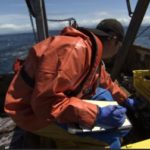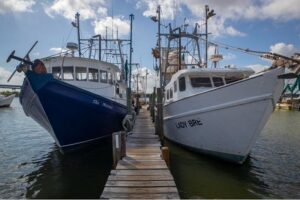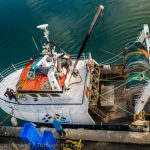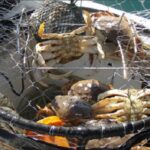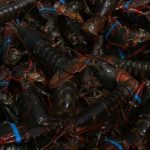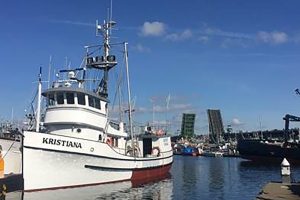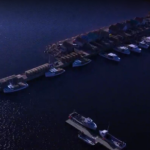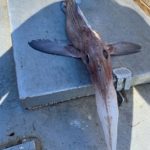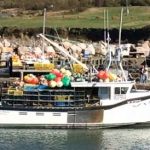Punitive New Rules Will Crush CA Dungeness Crab Fishing Families, Threaten Holiday Crab Traditions
For Immediate Release
November 2, 2020
Punitive New Rules Will Crush CA Dungeness Crab Fishing Families, Threaten Holiday Crab Traditions
State Ignoring Whale Population Growth, Practical Solutions in Favor of Extremist Politics Crescent City, CA – This week, the California Department of Fish and Wildlife (CDFW) put into effect onerous new regulations that among other things, could delay or close the state’s iconic crab fishery if whales are present near the crab grounds and could economically devastate our coastal communities that rely on the fishing and seafood industry.
Called the Risk Assessment Mitigation Program (RAMP), these punitive rules also include triggers for crab fishery closures that are more restrictive than even the strictest fishery laws in the nation, the Marine Life Protection Act (MLPA) and the Endangered Species Act (ESA).
“Regulators seem to be more concerned about the optics in the media of the rare occurrence of an entangled whale than the fact that the populations of these marine mammals, which migrate off our coast, are skyrocketing, and may soon be eligible for removal from the Endangered Species List,” said Ben Platt, president of the California Coast Crab Association (CCCA).
Immediately after the disastrous settlement agreement in March of 2019 in CBD vs Bonham, which mandated the new rules, CCCA began working to help CDFW craft regulations which would not unfairly penalize the fishery, while meeting the requirements of protecting ESA listed marine mammals.
But unfortunately, throughout the regulatory process, the powerful NGO’s lobbying for these extreme measures have largely succeeded in convincing CDFW to disregard the needs of the fishery. CCCA is instead arguing for the balance of common sense marine life protection with the economic and cultural importance of the historical fishing communities of coastal California.
“Despite the best efforts of the CCCA to contribute revisions to RAMP, which would fall in line with ESA guidelines and achieve more workable regulations for the fishery, regulators have moved ahead without any substantive changes,” continued Platt. “Essentially the state has ignored the advice of the people who know the ocean best and ESA legal experts who have been helping other fisheries survive NGO lawsuits for years.”
Recently revised numbers for Humpback whales, the only species with any real co-occurrence with the crab fishery, show a robust and rapidly growing population, with more than 7,200 whales and an annual population growth rate of 7.5 percent. Meanwhile, since whale interactions with Dungeness crab gear first became a concern to CDFW in 2015, the fishery has reduced the occurrence of these interactions with fishing gear to practically zero. The industry has been proactive in implementing measures to successfully reduce interactions and today poses no threat to whales or leatherback turtles.
“The RAMP rules will punitively devastate the state’s most widely shared and economically important fishery for no reason other than CDFW having to answer to legal attacks and constant lobbying pressure from profit-driven environmental NGO’s whose primary motives are not to save whales but to increase their status and budgets. These groups care even less about our iconic, sustainable fishing industry and coastal economies,” said Platt.
So how unfair are the RAMP rules? Even if there are only a few confirmed interactions with unknown gear during a crab season, the California fishery can be closed. That means the commercial Dungeness crab fishery is being held accountable for interactions with gear that are not part of the crab fishery!
That’s why the CCCA has repeatedly, during the RAMP development and review process, suggested a simple, low cost and practical solution which CDFW has not yet adopted: line marking. It would be easy to identify whether or not a line tangled with a whale was California commercial crab gear by simply spraying the equipment with painted lines with a designated color. Instead, state regulators are willing to shut down the whole season if there are unknown gear type entanglements instead of adopting this easily implemented solution.
“Regulators should have to answer for what they are doing to working fishing families. There was only one confirmed interaction with California Commercial crab gear during the 2020 season,” said Platt. “One. All the others were either recorded as “unknown” or from other fisheries.”
Fishermen who serve on the Whale Working Group and those who represent the CCCA have repeatedly proposed other simple, effective and affordable adjustments to existing crab gear. Some of these ideas include reducing slack buoy line and surface buoys and have already proven to help drastically reduce interactions with whales. Unfortunately, the powerful NGO Oceana has so far convinced regulators that the only option is to get fishermen to adopt highly impractical, ridiculously expensive and ineffective “pop-up”, so called “ropeless” gear, which is being aggressively pushed by outside gear manufacturing interests. The California Ocean Protection Council recently gave the Monterey Bay Sanctuary a large grant of $500,000 to test this gear type which fishermen from both coasts have consistently pointed out is unworkable and will lead to even more marine mammal interactions.
“We’ve already reduced interactions between marine mammals and our crab gear to practically zero,” said Platt. “That’s why the CCCA is encouraging and working with CDFW to prioritize the testing and implementation of common sense, practical solutions which will actually help mitigate whale interactions and also maintain a viable crab fishery.”
While there has never been a confirmed entanglement between a leatherback turtle and commercial Dungeness crab gear, RAMP includes rules that say the presence of even one turtle in a huge area around the San Francisco Bay Area, the most important crab grounds for the holiday Fall fishery, could delay the Fall opening or close the spring season there.
“The RAMP rules include provisions which will make it unlikely for the Bay Area tradition of Thanksgiving holiday crab to be available on any given year, as the presence of even a few whales spotted in Central California will prevent the season from opening before December. The rules could also limit access to fresh Dungeness crab to the rest of California’s seafood lovers throughout the Fall, Winter and especially in the Spring,” concluded Platt.
About the California Coast Crab Association
The CCCA is a non-profit 501(c)(6) trade organization composed of individual crab boat owners, hired captains and Dungeness crab buyers. The CCCA board of directors is made up of nine member fishermen and crab buyers with a combined 240 years of experience in the crab fishery. Our diverse membership includes the smallest operators with skiffs up to the largest crab boats on the West Coast, and our member-buyers range from small live crab peddlers to the largest distributor of seafood on the West Coast.
The CCCA was formed in May of 2019 after the disastrous out-of-court settlement agreement in CBD vs Bonham, which created new, highly restrictive, and unfair restrictions for the California Dungeness crab fishery. Dungeness crab is the most widely shared and economically important fishery to the West Coast commercial fishing industry, but the new ESA mandates created by CBD vs Bonham are threatening the viability of the fishery and the economic health of California coastal communities.
Since formation, the CCCA has been working hard with the crab fishing industry and the CDFW to find workable solutions to meet the mutually shared goals of protecting our most valuable fishery and minimizing interaction between marine mammals and our fishing gear. In recent years, the commercial fishing fleet has been proactive in addressing important issues by initiating legislation through our Dungeness Crab Task Force to create new rules, including tiered trap limits, a Whale Entanglement Working Group, a statewide Lost Gear Retrieval Program and Safe Practice Guidelines for fishermen. More information at www.cacoastcrabassociation.org.
Media Contacts:
Ray Young
Razor Sharp PR
916-505-4245 ray@razorsharppr.com
Ben Platt
President, CCCA
707-367-0385
kaybeefish@yahoo.com



































